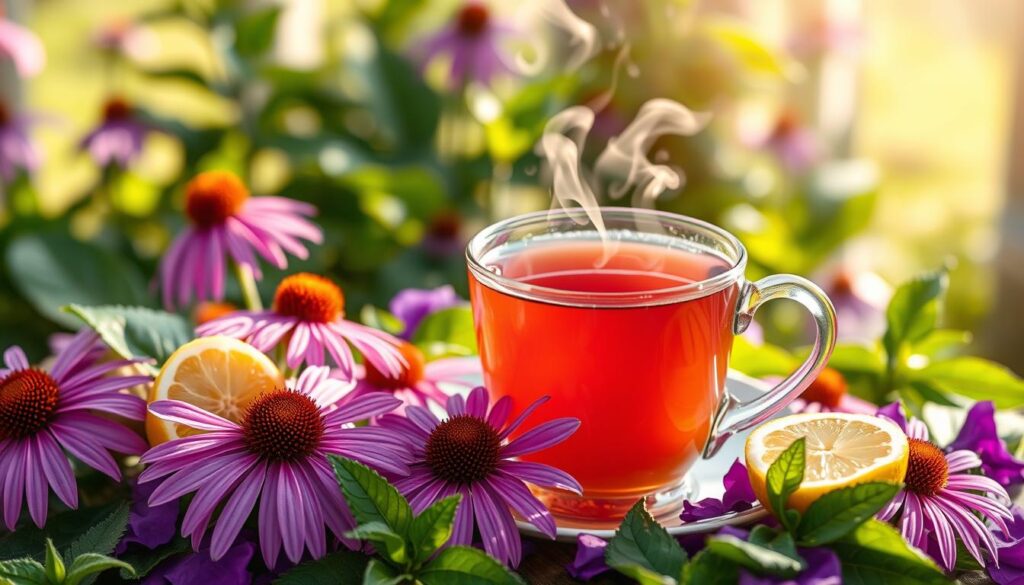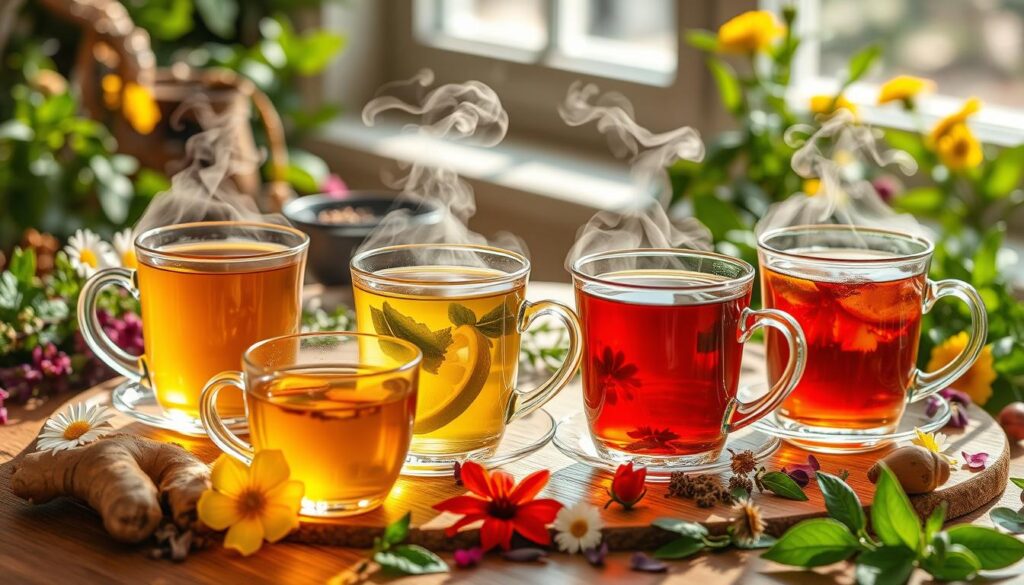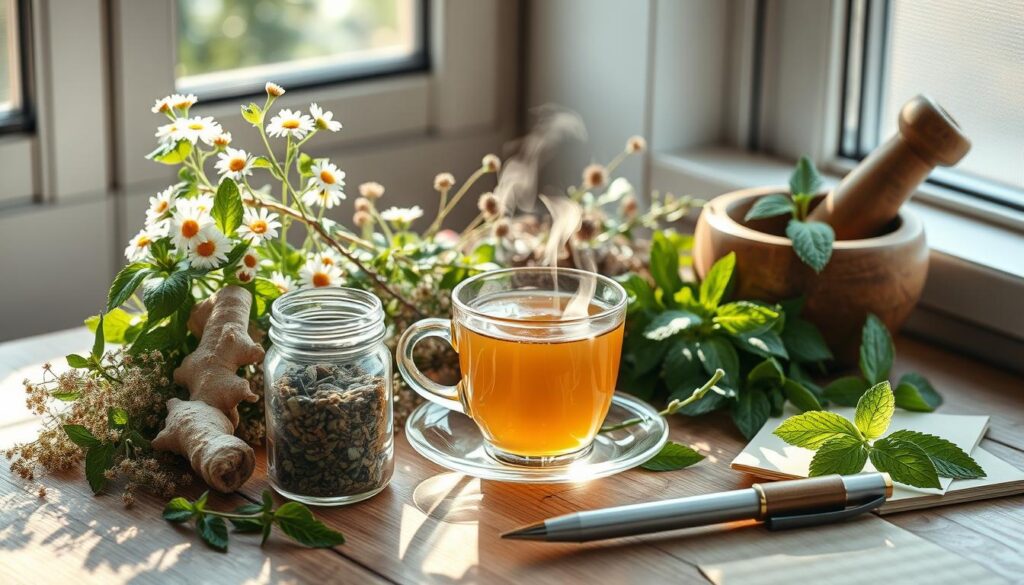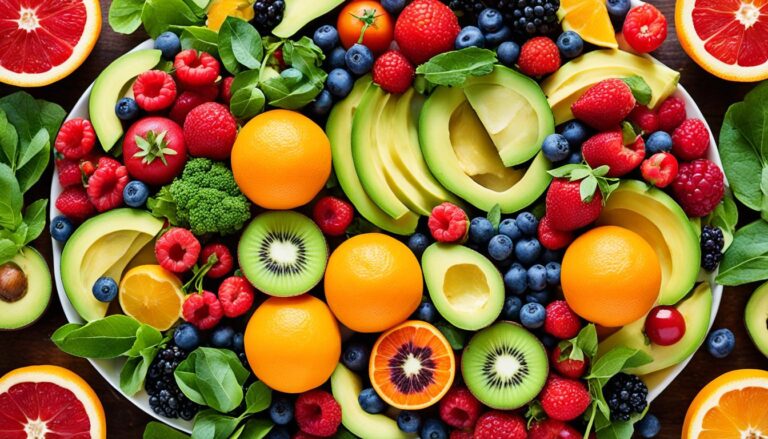Tea has been used for centuries for its health benefits. There are many types, like green tea and herbal tea. But what is the most medicinal tea? We will look into medicinal herbs and teas to find out how they can improve our health.
Medicinal tea, including herbal tea, helps treat many health issues. Studies show some teas may fight inflammation, protect against cancer, and boost antioxidants. We will explore how these teas and herbs can support our immune system and overall health.
Key Takeaways
- Medicinal tea has been consumed for centuries for its health benefits
- Herbal tea, including green tea, may have anti-inflammatory and antioxidant properties
- Certain teas, such as chamomile tea, may support immune function and overall health
- Medicinal herbs, including ginger and peppermint, may have potential health benefits
- More research is needed to fully understand the benefits of medicinal tea and herbal tea
- Medicinal tea, including tea and medicinal herbs, may be a useful addition to a healthy lifestyle
- Consulting with a healthcare professional is recommended before using medicinal tea or herbal tea for medicinal purposes
Understanding Medicinal Teas and Their Historical Significance
Medicinal teas have been a key part of traditional medicine for centuries. Ancient cultures used herbs and plant medicine to treat many ailments. The tradition of using tea for health started in ancient China.
Today, medicinal teas are more popular than ever. Many people choose organic tea and plant-based remedies over conventional medicine. Whether it’s chamomile tea before bed or peppermint tea after a meal, tea time is a big part of daily routines.
Ancient Origins of Medicinal Tea Usage
The use of medicinal teas started in ancient China. From there, it spread to Japan and Korea. In these cultures, tea was often mixed with other herbs to promote health.
Traditional Medicine Systems and Tea
In traditional Chinese medicine, tea is used with other herbs to balance the body. This approach focuses on living in harmony with nature. In Ayurvedic medicine, tea helps with digestion and stress, and is part of a daily routine.
Evolution of Therapeutic Tea Practices
The use of medicinal teas has changed over time. New herbs and ways to make tea have been added. Now, there are many medicinal teas, each with its own health benefits. Whether you want to relax, boost energy, or support health, there’s a tea for you.
What is the Most Medicinal Tea? Exploring Top Contenders
There are many medicinal tea options to choose from. Herbal tea and tea made from different herbs have been used for health for centuries. Healthline says green tea, echinacea tea, and chamomile tea are among the most beneficial.
Some of the top contenders for the most medicinal tea include:
- Green tea, known for its high antioxidant content and potential weight loss benefits
- Echinacea tea, which may help boost the immune system and reduce inflammation
- Chamomile tea, which can promote relaxation and improve sleep quality
These medicinal teas can be part of a healthy diet and lifestyle. They may offer health benefits when used with other herbal teas and herbs. Always talk to a healthcare professional before trying any new tea or herbal remedy.

| Tea Type | Health Benefits |
|---|---|
| Green Tea | Antioxidant content, weight loss, immune system support |
| Echinacea Tea | Immune system support, inflammation reduction, anti-aging effects |
| Chamomile Tea | Relaxation, sleep quality improvement, digestive health support |
Green Tea The Antioxidant Powerhouse
Green tea is known for its health benefits, thanks to its antioxidants. It’s an organic drink full of polyphenols. These compounds help fight inflammation and cancer.
A 2020 review looked at 142 studies with 1.1 million participants. It found green tea may lower cancer risk and improve heart health. A 2021 review also showed green tea could help with weight loss.
EGCG and Cancer-Fighting Properties
EGCG, a green tea component, fights cancer cells. It stops cell growth and causes cell death. This might lower the risk of cancers like breast, lung, and stomach.
Metabolism and Weight Management Benefits
Green tea boosts metabolism and aids in weight loss. It has about 29 milligrams of caffeine per 8-ounce cup. Regular green tea drinking may also help manage waist-to-hip ratios.
Echinacea Tea Nature’s Immune Booster
Echinacea tea is a well-known herbal tea that boosts the immune system. It has been used for centuries to fight off illnesses like the common cold and flu. The main types of Echinacea used are Echinacea purpurea and Echinacea angustifolia.
Research shows that echinacea helps create white blood cells. These cells fight infections, especially in the upper respiratory tract. Echinacea tea also has anti-inflammatory properties. It can help with swollen gums, sore throats, and skin issues.

The main benefits of echinacea tea are:
It supports the immune system.
It can lessen the severity of colds and flu.
It helps with inflammation and skin problems.
It might fight coronaviruses.
It could also reduce anxiety.
Echinacea tea is a natural way to keep your immune system strong and prevent illnesses. Its long history and many health benefits make it a favorite for those seeking a natural immune booster.
| Benefit | Description |
|---|---|
| Immune System Support | Echinacea tea helps support the immune system, reducing the severity of colds and flu. |
| Anti-Inflammatory Effects | Echinacea tea has anti-inflammatory effects, relieving conditions such as swollen gums, sore throats, and skin inflammation. |
| Potential Antiviral Effects | Echinacea tea may have antiviral effects against coronaviruses, reducing the risk of infection. |
Chamomile Tea The Calming Healer
Chamomile tea has been a key part of herbalism for centuries. It’s made from chamomile flowers and is famous for its calming effects. Medical News Today says it can help with sleep and anxiety.
Chamomile tea offers many benefits including:
- Sleep enhancement properties: It can improve sleep quality and duration.
- Digestive health benefits: It may soothe digestive issues, like irritable bowel syndrome.
- Anxiety and stress relief: It has been shown to reduce anxiety and stress, making you feel calm and relaxed.
As a natural remedy, chamomile tea is a favorite for those looking for a calming drink. It’s great for improving sleep, soothing the digestive system, or just relaxing. Chamomile tea is a wonderful addition to any herbalism routine.
| Benefit | Description |
|---|---|
| Sleep Enhancement | Improves sleep quality and duration |
| Digestive Health | Soothes digestive issues, such as irritable bowel syndrome |
| Anxiety and Stress Relief | Reduces anxiety and stress levels, promoting a sense of calm and relaxation |
Turmeric Tea Ancient Anti inflammatory Remedy
Turmeric tea has been used for centuries in traditional medicine. It’s known for its anti-inflammatory properties. The active compound curcumin in turmeric is what makes it work.
As a form of plant medicine, turmeric tea offers many health benefits. It can help reduce the risk of certain diseases.
Some of the key benefits of turmeric tea include:
- Reducing inflammation and improving symptoms of arthritis
- Supporting digestive health and reducing symptoms of inflammatory bowel disease IBD
- Boosting immune function and protecting against age-related diseases
Healthline says turmeric tea has anti-inflammatory properties. This could help lower the risk of some diseases. With its long history and modern uses, turmeric tea is great for your health. It’s a natural way to improve your well-being through plant medicine.

| Benefit | Description |
|---|---|
| Anti-inflammatory | Reduces inflammation and improves symptoms of arthritis |
| Immune function | Supports immune function and protects against age related diseases |
| Digestive health | Reduces symptoms of inflammatory bowel disease IBD |
Ginger Tea Digestive Aid and Natural Medicine
Ginger tea is known for its health benefits, especially for the digestive system. It helps with stomach issues and boosts digestive health. Its antibacterial properties also strengthen the immune system and reduce inflammation.
Some of the key benefits of ginger tea include:
- Relieving nausea, particularly in cases related to morning sickness during pregnancy
- Reducing fermentation, constipation, bloating, and intestinal gas
- Aiding in the digestive process with its natural component, gingerol
Medical News Today says ginger tea can help with digestion. It may lessen nausea and inflammation. It’s also good for fighting cancer cells, making it a great part of a healthy diet. Since it’s caffeine-free, you can drink it anytime.
Using fresh ginger makes the tea stronger. Steeping it for at least 10 minutes is best. Ginger tea is a great choice for digestive health and natural medicine.
Scientific Evidence Behind Medicinal Teas
Medicinal tea has been a key part of herbalism for centuries. Studies have shown its health benefits. Healthline reports that medicinal teas have antioxidant and anti-inflammatory effects. These can help improve overall wellness.
Some important findings on medicinal tea include:
- Antioxidant properties that can help protect against cell damage
- Anti-inflammatory effects that may reduce the risk of chronic diseases
- Potential benefits for heart health, including lowering cholesterol and blood pressure
Traditional Medicinals is a leading brand in herbalism. They offer over 60 organic teas for different wellness needs. With 50 years in the botanical medicine industry, they are a trusted source for medicinal teas.

Research on medicinal teas is always growing. New studies show more health benefits. As research continues, medicinal tea will likely stay popular for natural wellness.
| Medicinal Tea | Potential Health Benefits |
|---|---|
| Green Tea | Antioxidant properties, anti-inflammatory effects, potential benefits for heart health |
| Black Tea | Antioxidant properties, potential benefits for heart health, may reduce risk of certain cancers |
Proper Preparation Methods for Maximum Benefits
Preparing herbal tea the right way is key to its quality and effectiveness. The method you choose can make a big difference. For example, optimal extraction for antioxidants happens when tea is steeped for 5-10 minutes at 80-100 degrees Celsius.
There are two main ways to prepare herbal tea: the folk method and the weight method. The folk method uses 1 teaspoon of dried herbs or 2 tablespoons of fresh herbs for every 8 ounces of water. The weight method calls for 0.5-5 grams of dried herb per 8 ounces of water. Remember, the quality of your tea can be affected by how you store it and the dosage you use.
Tea can stay fresh for about 12 hours at room temperature before it starts to taste off. High-quality organic herbal teas are available from suppliers like Mountain Rose Herbs, Mushroom Harvest, and Pacific Botanicals. Choosing organic tea ensures it’s free from harmful chemicals. By using the right preparation methods and quality organic tea, you can enjoy a healthy and tasty drink.
The usual daily amount of herbal tea is three to four cups. But, always talk to a healthcare professional before drinking herbal tea, especially if you have health issues or are pregnant. Being careful with how you prepare and dose your tea ensures you get the most out of it safely.
Safety Considerations and Potential Interactions
When you drink medicinal tea, think about safety considerations and possible interactions. Herbalism can help with health and wellness, but it must be used wisely. Some medicinal teas might affect medications or have safety considerations, like during pregnancy or nursing.
Some medicinal teas could mix badly with medicines, like blood thinners or diabetes drugs. Also, certain herbal teas might not be good for people with certain health issues, like high blood pressure or kidney disease. Always talk to a doctor before trying any medicinal tea, especially if you’re on medication or have health problems.

To avoid risks, make sure to prepare medicinal teas correctly and follow the right amounts. Use top-notch herbal teas and know about any safety considerations and interactions. By being careful and informed with herbalism, you can enjoy medicinal tea safely and get its benefits.
| Medicinal Tea | Safety Considerations | Potential Interactions |
|---|---|---|
| Chamomile | Pregnancy and nursing | Benzodiazepines and estrogens |
| Ginger | Diabetes and high blood pressure | Blood thinners and diabetes medications |
| Green Tea | Pregnancy and nursing | Certain medications, such as blood thinners |
How to Choose Quality Medicinal Teas
Choosing the right medicinal tea is crucial. With so many options, it’s easy to get lost. Look for organic and sustainable teas. This ensures quality and supports the environment.
Third-party testing and certification are key. They confirm the tea meets quality standards and is safe. Also, check the manufacturer’s reputation and read customer reviews.
Teas like green, echinacea, and chamomile are top choices. They offer health benefits like reducing inflammation and improving sleep. Opting for high-quality tea can greatly enhance your health.
| Medicinal Tea | Benefits | Quality Factors |
|---|---|---|
| Green Tea | Antioxidant, anti-inflammatory | Organic sourcing, third-party testing |
| Echinacea Tea | Immune system support, anti-inflammatory | Sustainable sourcing, certification |
| Chamomile Tea | Sleep improvement, anxiety relief | High-quality herbs, organic farming |
Conclusion Making Medicinal Tea Part of Your Wellness Routine
Medicinal teas are a natural way to improve health and wellness. They are full of antioxidants and compounds that help the body. Adding medicinal teas to your daily routine can boost your health in many ways.
Green tea fights cancer, and chamomile calms the mind. Medicinal teas are versatile and can improve immunity, digestion, and sleep. Drinking them regularly can also help with weight management.
Start using medicinal teas in your daily life. Try different blends to find what works best for you. Let these teas bring balance and healing to your life.





